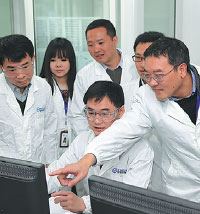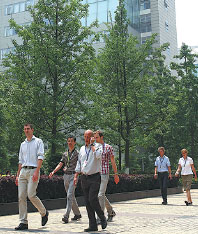Flexibility central to attracting intl talents
Chengdu High-Tech Industrial Development Zone in Sichuan province is introducing overseas talents in a more flexible way, through the construction of an overseas personnel innovation and startup center.
It was the fourth high-tech zone to gain approval from the China Association for Science and Technology to build such a center.
Wang Lei, deputy director of the human resources department of the zone's personnel, labor and social security bureau, said the high-tech zone has set up two of these stations in Frankfurt, Germany, and Copenhagen, Denmark, together with the Chengdu Association for Science and Technology.
"The overseas talents will not have to stay in the Chengdu high-tech zone. They can just do research overseas and achieve their scientific research at the high-tech zone's overseas centers," he said.
The Chengdu high-tech zone will spend 200 million yuan ($29.5 million) to establish a related fund, which will offer financial support to overseas talents who complete their scientific research achievements in the zone.
A single program could receive as much as 20 million yuan in support.
The Chengdu high-tech zone will also give subsidies to those companies and universities that jointly establish and operate offshore stations. Each company could receive as much as 500,000 yuan in subsidies a year, while each university could receive as much as one million yuan a year.
In the first half of this year, the high-tech zone introduced three frontier technology cooperation projects, respectively led by Nobel laureates Jack W. Szostak, K. Barry Sharpless and John B. Gurdon. It has also established three industrial technology research institutes for large nucleic acids, biological medicine and 3-D bio-printing.
"Talent resource is the primary resource. To serve the talents is to serve development," said Gan Lijun, director of the high-tech zone's personnel, labor and social security bureau.
She said the high-tech zone aims to build itself into an international innovation and entrepreneurship center. "We will try our best to attract more global talents by creating an international service system and environment for innovation and pioneering work."
|
Li Jin (right), founder and chairman of HitGen, has come back from the UK and is one of the overseas talents the Chengdu high-tech zone has recruited. Photos Provided To China Daily |
|
The Chengdu high-tech zone aims to build itself into an international innovation and entrepreneurship center. |
(China Daily 10/27/2016 page19)
















